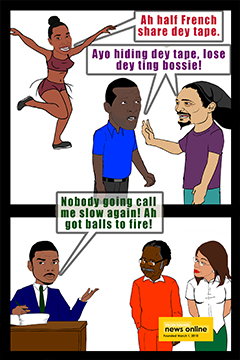Parliamentary pay cuts
COVID-19
A term that has changed the world forever.
Here in the Atlantic/Caribbean region, we would normally be waving to tourists, selling them different island concoctions, giving them directions to local landmarks or driving them around in our minibuses and taxis.
Yet, here we are in May, with empty airports, empty taxis, empty hotels, empty restaurants and empty Airbnbs.
This all adds up to individuals with empty pockets, businesses with empty cash registers and governments with empty coffers.
Meanwhile, individual, corporate and government expenses have risen exponentially.
Tens of thousands of COVID-19 tests, overtime for essential workers, emergency funding for the unemployed all adds up to tens of millions in unfortunate and unforeseen expenses.
The net result is that every government in the region now faces major budget deficits.
In the red
Here in Bermuda, the Minister of Finance, The Hon Curtis L. Dickinson JP MP, last week announced that we are facing a shortfall of approximately 300 million dollars.
To put it in context, in February our Budget 2020-2021 had us on track to take in $1.1B as revenue.
With revenue from cruise ships, hotel tax and other related payroll tax now non-existent, our revenue projections are now nearer to 800 million dollars.
Public Officers
So, in an effort to keep government services and personnel going, the obvious choice is to look to minimalise expenses, without cutting the jobs of Civil Servants.
Bermuda currently has a total population of roughly 64,000 persons, and a total working population of 33,000, with approximately 5,000 of them being public officers, inclusive of:
Teachers
Police
Fire and Rescue
Sanitation
Medical staff
Marine and Ports
Public Works
Administration
Legal staff
There are many more job fields filled by these public officers. Each one of these workers have family and or financial commitments.
So, without them being paid, our economy would face even further turmoil.
Leadership
Over the last week, the government, led by Premier Hon E. David Burt JP MP, has begun talks with all of the seven unions that represent civil servants.
This is aimed at reaching workable middle ground in an effort to trim costs, whilst preserving jobs.
In a show of leadership and unity, on Sunday, May 17, 2020, a decision was made, by both the government and opposition, to have all parliamentarians take a 12.5 per cent pay cut and freeze in parliamentary pension contributions.
For reference, Members of Parliament have a gross pay of $56,000 and Ministers are paid $156,000.
Arguably, there will be those who say this should have happened sooner. There can and will be debates to and fro about this.
What is more important; however, is that all who were elected to serve, have happily taken a cut in pay.
In doing so, it sets a template for others to follow suit.
Contributions
COVID-19 will affect every segment of our economy in a negative way.
Some businesses will not survive. Thousands of jobs in the hospitality industry have vanished overnight.
That is the unfortunate reality.
At the same time; however, this economic pandemic has allowed us to see the best of who we are as human beings.
Every one of us will have to sacrifice in different ways. Let us not see it as a sacrifice, rather as a contribution to our fellow human beings.














.png)





















2 Responses to “Parliamentary pay cuts”